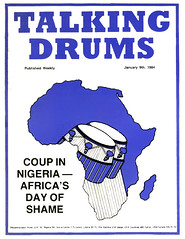Cuban Troops And South Africa's Raids
By a Correspondent
According to the South Africans the aim of their massive invasion was to blunt an expected annual rainy-season southward thrust by SWAPO fighters who were not only estimated to number 1,400 but also believed to have been freshly trained in Angola.
And they claimed to have achieved their objective by bombing the SWAPO headquarters in Angola inflicting heavy human and material losses on the freedom fighters.
Again, granting the frequency of South African raids into neighbouring Angola, Mozambique and Lesotho, the only surprise element in the latest invasion of Angola was its timing, only a few days after a historic meeting between Mr Pik Botha, the South African Foreign Minister and senior Mozambique ministers in Swaziland on December 20th, 1983. The meeting was intended by the South Africans to divert attention from its support for and involvement in Jonas Savimbi's UNITA forces' attempts to overturn the government of the MPLA.
This UNITA factor has been presented as an excuse for the invitation of Cuban soldiers by the Angolan authorities to bolster the stability of the MPLA government. And to date Cuban presence in that country has been variously estimated at between fifteen and twenty thousand. It is also meant to deter the South Africans from trespassing onto Angolan territory with impunity.
But the Cuban presence in Angola has also produced an intractable riddle that has been recognised at the United Nations, Non-aligned Movement and other international forums as a major stumbling block to Namibia's independence aspirations. For, the United States of America, which is a member of a five nation contact group to negotiate for Namibia's independence, has refused to put pressure on South Africa on the grounds that the presence of Cuban troops in neighbouring Angola posed a threat to South Africa's own security.
Recognising the resoluteness of the Americans in their position, deposed President Shagari of Nigeria, recalled a decision of the meeting of frontline states in Lagos in 1981 lamenting the inability of the Organisation of African Unity to concretise the long standing idea of an African Defence Force to assist member countries whose security might be threatened, adding that the absence of such a force necessitated the invitation to Angola of an extra-African force.
But has the necessity of Cuban troops in Angola, in the absence of an African Defence Force, been justified? The Americans link the Cuban pres- ence in Angola to Namibia's struggle for independence and therefore refuse to pressure South Africa to accede to international demand to give up its trusteeship control over Namibia.
Above every other consideration is the ease and impunity with which the forces of apartheid South Africa invade neighbouring countries in pursuit of freedom fighters whom they refer to as terrorists.
The question being asked therefore, is: has the presence of Cuban troops in Angola been able to deter South African raids or have the reputed Cubans been able to intercept the South Africans? If not, what are they there for? Or is it a case of the Cubans being more concerned with the millions of dollars they earn for their country than the objective of stopping the South Africans from harassing their neighbours?
The independence of Namibia is being unduly delayed by American determination to link it with Cuban presence in Angola. And if the Cubans can't stop the forces of Savimbi's UNITA and apartheid South Africa from destabilising countries like Angola, Mozambique, Lesotho etc, then what is all the fuss about the necessity of Cuban troops in Angola?
